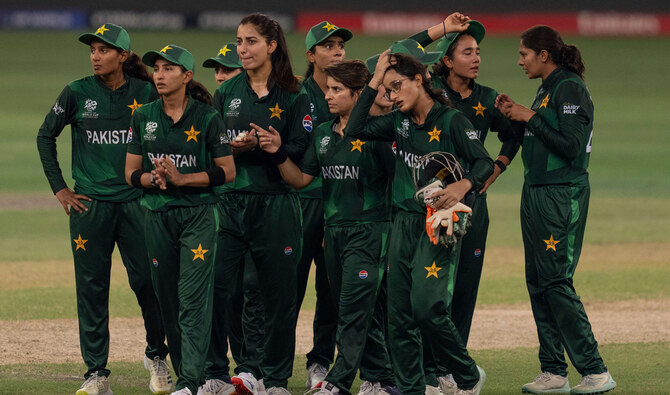ISLAMABAD: Australia Women secured a nine-wicket victory over Pakistan Women in the 14th match of the ICC Women’s T20 World Cup 2024 at the Dubai International Cricket Stadium on Friday evening, handing Pakistan their second defeat while Australia claimed their third win of the tournament.
Australia chased down the 83-run target in 11 overs as skipper Alyssa Healy top-scored with a 23-ball 37 before retiring hurt in the 10th over of the innings. Her 36-run opening partnership with Beth Mooney was cut short by Sadia Iqbal in the fifth over when Mooney departed for a run-a-ball 15 with the help of three boundaries.
Ellyze Perry, who hit the winning run for Australia, remained unbeaten for 22 off 23 balls hitting two fours along with Ashleigh Gardner (7 not out). Out of the seven bowlers used by Pakistan, only Iqbal remained successful while Syeda Aroob Shah was denied Healy’s wicket as Nashra Sundhu dropped her in the eighth over.

Australia's Ashleigh Gardner bats during the ICC Women's T20 World Cup 2024 match between Pakistan and Australia at Dubai International Stadium, United Arab Emirates on October 11, 2024. (AP)
“We are not up to the mark in batting. That’s not how you approach T20 cricket, it’s embarrassing and we need to change that and win games for Pakistan,” wicketkeeper Muneeba Ali said after the match.
Ali took charge of the team as captain Fatima Sana flew back home ahead of the match after the death of her father.
“Everybody needs to step up and we need to have the confidence to win the last game.”
Earlier, after Australia won the toss and opted to field, Gardner tied down the Pakistan batters with a four-wicket haul while she was backed up by tidy spells from Annabel Sutherland (2-15) and Georgia Wareham (2-16).
A quiet powerplay saw Pakistan amass 23 runs for the loss of two wickets before they were reduced to 39-5 in 9.4 overs. Aliya Riaz, who top-scored with 26 off 32 hitting three fours, stitched a 19-run sixth-wicket partnership with Iram Javed and a 13-ball 18-run seventh-wicket stand with Tuba Hassan to take Pakistan to 82 in 19.5 overs.

Australia's Ellyse Perry bats during the ICC Women's T20 World Cup 2024 match between Pakistan and Australia at Dubai International Stadium, United Arab Emirates on October 11, 2024. (AP)
Megan Schutt picked up one wicket in her three-over spell to surpass Nida Dar’s tally of 143 T20I wickets and became the leading wicket-taker in Women’s T20Is. Schutt snaffled her 144th T20I wicket when she dismissed Sadaf Shamas in the fifth over.
Pakistan will now face New Zealand in their last group game on 14 October in Dubai with the first ball to be bowled at 1900 PKT.
With input from AFP

















